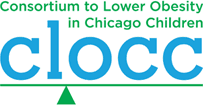by Adam Becker, PhD, MPH, Executive Director
Happy New Year! 2012 is an especially happy new year for CLOCC as it marks our 10th year as a Consortium collaborating on childhood obesity prevention in Chicago and beyond! I hope that as partners you will feel as proud of our shared accomplishments as we do as staff members. Throughout this 10th year we will be reviewing our past successes, highlighting our current collaborative work, and visioning for our future. We have several special events and projects planned that will unfold in 2012 to commemorate this important 10-year milestone – watch for details in the coming weeks and months! We have organized these activities around quarterly themes that have been important for CLOCC as we’ve grown since 2002 and that will carry us into the next 10 years. In our first quarter, we reflect on data and evidence. These were instrumental in the consortium’s origins as we built our efforts on what we knew and what we still needed to learn about childhood obesity in Chicago. We will also focus this quarter on research and how it undergirds our data-driven and evidence-based approach.
So first, I would like to remind you of where we began.
Thanks to the vision of our founder, Dr. Katherine Kaufer Christoffel, and initial funding from the Otho S.A. Sprague Memorial Institute, CLOCC came into being in late 2002. Our first meeting drew about 40 people from across the city – pediatricians, staff from community-based organizations, researchers, representatives from city agencies, and others. We were a diverse group even then!
It may be hard to believe now, but back in 2002 we faced the hurdle of convincing people that the childhood obesity epidemic was actually real, so data and evidence have always been important to CLOCC. The gathering and dissemination of data served us well at the very beginning when, under the leadership of our founding Executive Director, Matt Longjohn, we started to build our consortium. Most people had no idea where the city stood in terms of childhood obesity rates, but our interest in finding out helped Kathy and Matt to make the case to potential partners that they should get involved in this growing collaborative effort. In fact, back in 2002 the prevalence data were scarce, but even the little we had told an alarming story. The 1999 National Health and Nutrition Examination Survey (NHANES) data indicated that 13% of children ages 6 – 11 and 14% of adolescents ages 12 – 17 were obese. Our goals back then were to share the data we had to motivate individuals and organizations to join the consortium and to work toward collecting more.
A major early success was the release of the first citywide prevalence data for Chicago children entering school for the first time (children aged 3 – 7) at the end of 2003. They were collected through a partnership with the Chicago Public Schools and the Archdiocese of Chicago under the leadership of research scientist Dr. Maryann Mason, who now serves as our Community Research and Evaluation Director. The data showed that nearly one quarter (24%) of Chicago children were entering school already obese — two and a half times the national average at that time. This data release literally put CLOCC on the map, with coverage on the front page of both the Chicago Tribune and the Chicago Sun-Times.
Since those early days we have worked hard as a consortium to keep our collective eyes on obesity rate data. We held the Child Health Examination Surveillance System Summit in 2008 to develop statewide consensus and gather recommendations to create a surveillance system using data from the child health examination forms. While attention to the issue has ebbed and flowed over the years, the state is showing re-emerging interest. The Illinois Alliance to Prevent Obesity, a statewide coalition of organizations focused on obesity prevention for all Illinoisans, identified surveillance as one of three top priorities for their first year of action. The city is making great strides as well, with a five-year inter-agency agreement between the Chicago Department of Public Health and Chicago Public Schools to look at prevalence rates now and into the future. These advances have grown out of our consortium’s initial work and are laying the groundwork for a system that would provide up-to-date and annual obesity prevalence data. These data will help us as a state and city to allocate resources strategically, where prevention and intervention are needed most – decisions that are best made when data-based.
CLOCC staff and partners conducted a second round of surveillance in 2009. The great news was that we found a reduction of 2% in the overall prevalence of obesity among children aged 3-7 years old. The not-so-great news was that even with this new prevalence rate of 22%, we were still twice the national rate of 10.4%. Knowing that our staff would not have the resources to continue to do this surveillance at the frequency with which it is needed, we have been advocating for the state and the city to create a sustainable system for monitoring child health statistics, with a focus on obesity.
But data and surveillance have not been our only activities related to generating knowledge about the issue. In 2003, we kicked off our Seed Grant Program. CLOCC Seed Grants provide small amounts of funding to support the development of local research and evaluation efforts to contribute to our knowledge base and to increase the capacity of local investigators to get increased funding to continue or expand their work. In 2007, we revised the Seed Grant Program to fund fewer projects but at greater amounts. In 2010, we released a report on the impressive work done through our Seed Grant award recipients. A number of our grantees have been able to publish in national journals, influence local policy, expand local programs, and obtain large federal grants to continue their work.
Here in the CLOCC office, some of our staff members have also conducted research; some on behalf of our partners. For example, I led a study to help the City of Chicago Inter-Departmental Task Force on Childhood Obesity understand that impact that the new standards for food and physical activity in childcare centers have on center practices in low-income communities across Chicago. The findings of this study have already begun to help shape education and training mechanisms for Chicago’s childcare providers and have contributed to a statewide interest in the role that childcare providers can play in the health of the very young. Other research we conducted in our first ten years has included exploration of expanding obesity prevention services tied to distribution of free produce, evaluation of the Open Streets initiative which closed street routes to auto traffic to create safe places for physical activity in five Chicago communities and evaluation of a Chicago Park District program designed to provide opportunities for increased physical activity in after school programming. We’ve also conducted multiple waves of a community health survey in Humboldt Park and Englewood and done a baseline survey in Pilsen.
Looking to the future of our data, research and evaluation activities, we will continue to provide evaluation services and capacity building to CLOCC partners. We will continue to support CDPH and CPS as they develop a system for reporting on childhood health indicators, including BMI. We will continue to encourage the State of Illinois to develop a similar system. And we will continue to monitor and disseminate the most up-to-date research from across the country to help us locally to remain on the cutting edge of best-practice obesity prevention strategies. You can also look forward to further changes to our Seed Grant program – with a more specific focus on policy, systems, and environmental change – an important emerging element of our work in Chicago communities.
And this brings me to next quarter’s theme! Look for a new post from me in April when I will talk about the lifeblood of CLOCC, our community partnerships – past, present, and plans for the future. Talk to you then!



